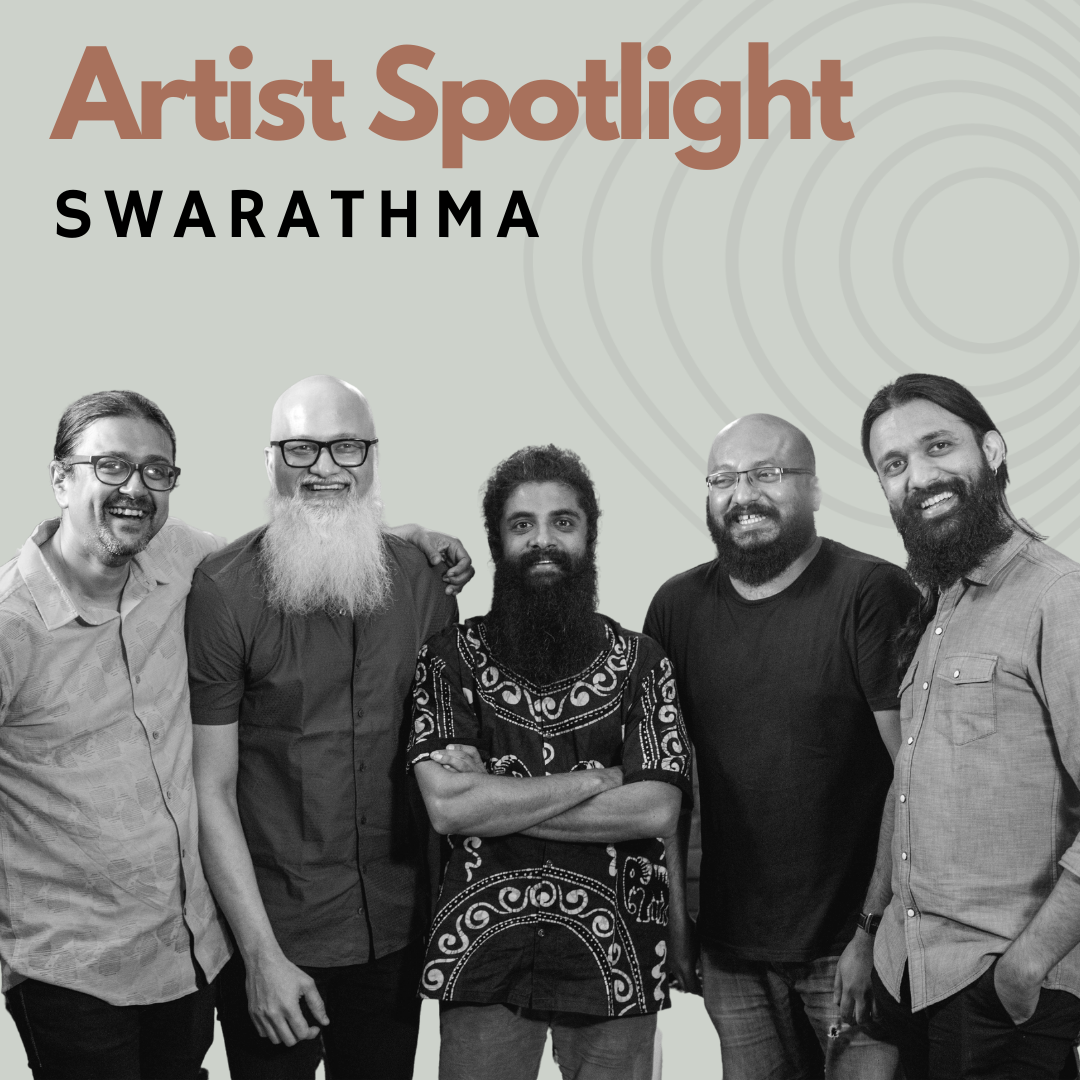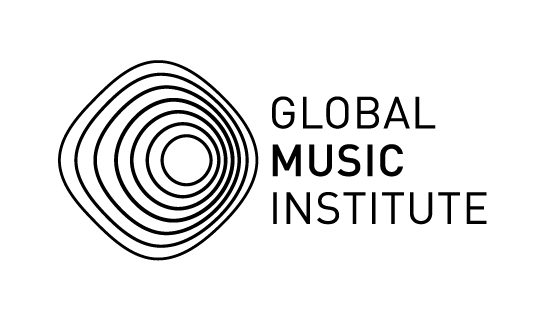
02 Feb Artist Spotlight: Swarathma (Part II)
The Artist Spotlight series aims to dive deep into the world of contemporary musicians to learn about their stories. Through these conversations, we explore their humanity, personality, musicality, and artistry. Today’s feature brings to you part 2 of our conversation with Jishnu Dasgupta and Varun Murali from one of India’s most loved bands, Swarathma, talking about their recent projects, touring, creative resilience, and what’s next for the band.
This interview has been edited and condensed for length and clarity.
You were recently mentors/ collaborators for Rhythms of the Earth. What did you learn from this experience and how did the interactions with the tribal musicians influence your music making process?
Jishnu: It was an absolutely amazing, life affirming kind of an experience! For us to be able to sit with indigenous musicians and learn from them, listen to them, even as we helped them to write new songs that reflect the ideas of today– it was a hugely enriching experience for us. It was out of this world to sit with people who are so rooted and close to the earth, and learn about their life, and music. Music, dance, art– these are not separate disciplines in their life. It’s all united. When they sing they dance, when they dance they play, and when they play they sing, so it’s all unified. We are looking forward to the output. We should be able to release a new album of contemporary tribal songs. We were supposed to do the production of that in February but now with the third wave, we don’t know when it is going to happen; hopefully soon.
Varun: I think that that project is something we are really proud of. It is the first time we pulled off something as large in scale as that. We didn’t go there as mentors alone but we were also in charge of handling that entire event– we played too many roles! It was something where we said “wow, we can’t believe that we pulled it off!” We are extremely grateful and fortunate that we are involved in the project again and we have just finished phase 1 with them.
Given how things have been with covid, we haven’t had the time to sit and write new songs the way we used to do traditionally. Whenever we do that we get back to the jam room, some bit of it is going to come through for sure. These influences have a strange way of sneaking in when you least expect it. I think it takes time for it to become an influence and sneak into your songwriting process. It often doesn’t happen immediately. It takes a while for it to sort of settle in and cement that process in a way.
You were just talking about the relationship indigenous musicians share with the earth, and I wonder, how does your relationship with the Earth influence your songwriting and artistry?
Jishnu: I think it does really influence us in a big way and a couple of those are easily identifiable in the songs that we have written. Some of our best known songs have something to do with earth in some sense. For example, there is a song called ‘Pyaasi’– it’s about the river Kaveri, and it is the voice of the river where the river is questioning humanity. There are a couple of other songs in the same reign. There’s a song about the price you pay for development, there are optimistic songs about our hope for the Earth…
The way we feel about the earth is very demonstrative in the way that we behave. One very recent example is that we were updating our hospitality riders, and one of the things we did in that was we took out the line saying we require twelve bottles of water on stage before we begin the performance. We replaced it by saying that the band encourages the use of non-single-use plastic, and we would prefer that there be a canister of water backstage, and we will bring our own water bottles.
Another example, more recently, is that recently we brought out this collection of NFTs on the 15th of January and one of the questions was “are you concerned about the environmental impact of NFTs?”’ I didn’t know as much but when I read about it, I learned that the mining of cryptocurrencies has an environmental impact in terms of the amount of power it consumes for the proof of work, and how NFTs are trying to move away from conventional to renewable powers, and move from proof of work to proof of stake. This is something to think about and something to understand, wrap your head around, and have a conversation about. I think that with everything that we are facing– whether it is a threat to the environment or to the climate, a large part of the solution begins in our ability to sit down and have a conversation, rather than assume or believe that what you know is the absolute truth. And I hope that attitude reflects in the way we write songs as well.
You started as a performance outfit, grew into recording artists, and have engaged in many collaborations over the years. From there, to now exploring the world of vlogs, online concerts, and NFTs, what are the key markers in your creative and business decision making processes?
Jishnu: For the business of the band- from online concerts to collaborations and things, I think if you take it all away, the thing we all agree with each other on is that we are here to write and perform songs that help us connect with each other and with the audience. That’s where we find our greatest joy, and that’s why we are here. A lot of the collaborations we have done have been in search of that connection with each other, and musicians and artists that we really admire. The world of online concerts, and NFTs, are a direct result of how the live concert stage has been taken away from us because of the pandemic. We are looking for alternative ways of connecting with people, and the online concerts were one way to do that. More than online concerts is actually a thing we started called ‘And other stories…’.
Varun: One thing we have always focussed on is how we interact with our audience, and finding the best ways to keep in touch, and not be an inaccessible band. That is how we came up with ‘And other stories’ during the lockdown, where we thought about starting a Google Meet call where a certain section of people who are really interested in our music can join voluntarily. There is no ticketed entry but we are going to limit the numbers so it can be a close knit thing. We decided that we would do it at a specific time, where people would come only if they are free, and they stay for the entire duration of that call. To our surprise, people stayed for the whole call which was almost an hour and a half. In fact, one of the attendees insisted that she would like to pay for it, and then we decided that instead of making it a ticketed thing, we are going to call it a ‘panipuri fund’ where we said that if you feel like sponsoring our chaat, please donate it to that. Alo, we figured that it’s a great platform to showcase a lot of upcoming artists we are excited about. So we invited singers, and songwriters, to come on these calls and showcase their songs, and we featured a bunch of artists which was great fun.
You recently embarked on the Dus Minute Aur release tour. How was the post-pandemic touring experience?
Varun: Firstly, we were just so eager to get on the road and do a show. The whole online gigs we were doing during the lockdown didn’t come close to doing a show with the in-person experience so we definitely wanted to get on stage in some way or the other. For the first gig that we played, it took us a while. It was a bit of a strange but familiar feeling being on stage. For me, I was trying to figure out my guitar pedal board patch numbers, trying to figure out which patch was for which song, trying to remember the Ableton key commands… It took a bit of getting used to. I think midway through the gig I got remotely comfortable and by the time we were doing our second gig, that’s when it felt like “yeah, now we are fine.” It was so much more comfortable. The first gig was all over the place for me but we found our way around, and once we started playing our songs, we started remembering the things… It’s like muscle memory and everything just comes back. But experiencing that coming back was strange and it was like a rollercoaster ride.
What lies ahead for Swarathma?
Jishnu: Lots! We have a new release coming up with five new songs that we are in the process of putting together. We will hopefully stagger the release through the year, and we have the tribal music album coming out– these are the two big things. We are also looking at working on a collaborative mini album where we jam with musicians we admire, and musicians of today. So a lot of music! I think a large part of it remains on whether or not we can get back out there and tour, but even if we can’t, what we have learned from the last year and a half is some form of creative resilience. How can you stay positive and in a creative way of mind even if things are not the way they used to be?
Can you please share some tips for young artists to hone into their creativity and develop creative resilience through adversities?
Jishnu: We each have our ways of dealing with such circumstances and situations, but there is something that I read that really helped me. This is from a book called ‘Art and Fear,’ I highly recommend everybody read it. ‘Art and Fear’ talks about something very important when it comes to artists and that is destination. Artists always need destinations. For us as a band, the destination was the stage which got taken away and that left us in a state of limbo, disarray, and confusion, where we were questioning ourselves and our choices. What this book says is that destinations that are not in your control could be frequently taken away from you, or you could achieve them. And once you achieve that destination, you will be like “where do I go now?” What this book suggests is to find a group of like-minded fellow artists with whom you share your in-progress work frequently, and treat that as a destination. And if you treat that as a destination, you will always have something to create for, and you will always have a destination that allows you to stay motivated.
The other thing, which is something I learned from others in the band, is ritual, schedule, and a certain predictability which requires you to show up as an artist everyday. I have to remember to show up as a musician everyday even if it is for a short period of time. There is a compounding advantage to that. A little bit of an effort consistently allows you to have exponential growth. Remember to show up everyday, and have a destination that keeps you inspired.
Varun: For me, one of the major things and how I deal with a lot of stuff is to try and look at it from an external or zoomed-out perspective to see how small it is in a larger scheme of things. A large part of that clarity came to me from my church. Understanding how the music that I play is just one of the things I do, and it doesn’t have to become my entire identity, and it is not what I am entirely, helped me understand that all of it is so tiny in the larger scheme of things. It barely amounts to anything. So that’s one of the ways that I have dealt with the last two years because that situation was so new to everybody. As an artist, if you find that grounding somewhere, dealing with everything else becomes a lot easier. If you are flying around like a kite with no thread, I don’t think you will be able to be content with anything else that happens.
As a leading band in the Indian independent music scene for over a decade, what is the legacy you would like to leave behind?
Jishnu: I think this is the first time that we are getting the legacy question! Today is a big day, and we are going to pencil this in as the day we got asked the legacy question. But because it’s the first day, we don’t have an answer. The heaviness of the word comes from the fact that legacy is left behind by people who are legends, and the things they have said ring on for other people to hear and internalise, and we just don’t think we are there yet. We haven’t even done our best work, so what do you mean by the word legacy? But just like I made peace with the word ‘uncle’, I have to make peace with the word ‘legacy’. And what we are leaving behind could be a cool legacy. Never take yourself too seriously, is a legacy. Criticism is not necessarily always negative- that is a legacy. I think you should check back with us in about a year and maybe we will have a better answer.
Varun: Let’s say I take the liberty to slightly modify the question and ask, what if we were to stop making music today? Then what would we like to be known for? I think it’s just the music. I don’t think we want to be known for anything else as a band. We would like to be known by other younger bands and artists who really like us for the decisions we have made– like not wanting to play covers, and choosing to make your music, having your own voice no matter what… I think that’s what we would like to be known for.
Interviewed and edited by Senjuti Maitra



No Comments